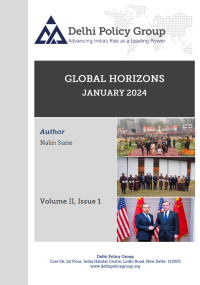Global Horizons
Date: February 08, 2024
The new year has brought little comfort to the international community, as the future, in terms of both international security and economic order, remains clouded by uncertainty. Meanwhile, horrific conflicts are being routinised.
The author begins by surveying the grim landscape of the Middle East, from Israeli efforts to eliminate Hamas to the ICJ interim judgement, the actions of the Houthis and other militias to US retaliation, with continuing prospects of conflict escalation and no ultimate solution to the Palestinian issue on the horizon.
Meanwhile, the prognosis of the war in Europe is looking increasingly troubled from the Ukrainian perspective, even as uncertainty over the outcome of the US Presidential election is causing consternation in many parts of the world.
The month marked a setback for the PRC, with the election of the DPP candidate as the next President of Taiwan. Extended talks between Chinese FM Wang Yi and US NSA Sullivan held in Bangkok on January 26-27 continued the trend of high-level engagement, with Chinese concerns over Taiwan and the demand that the US and China should treat each other as equals being highlighted.
The month of January also saw several significant developments related to India’s foreign, economic and security policies.
The President of the UAE was the chief guest at the Vibrant Gujarat Global Summit held on January 10-12, with multiple agreements being reached for India-UAE cooperation in diverse fields, including trade and investment, food security, health, green energy and maritime security.
President Macron of France visited India on January 25-26 as chief guest for India’s 75th Republic Day, marking a high point for the future development of this longstanding strategic partnership, of which defence and security ties and intensified cooperation across the Indo-Pacific are important components.
Following elections in Bhutan during the month which saw a change of government, the Indian Foreign Secretary paid an official visit to Thimphu on January 29-31 for wide-ranging talks on all aspects of this extensive and close bilateral partnership.
The author concludes that the challenges before the Indian foreign and security policymakers remain complex, and their efforts to find like-minded partners to safeguard India’s interests will get more intense as the year progresses.
To read this Global Horizons, Vol. II, Issue 1, please see the PDF attached.
The author begins by surveying the grim landscape of the Middle East, from Israeli efforts to eliminate Hamas to the ICJ interim judgement, the actions of the Houthis and other militias to US retaliation, with continuing prospects of conflict escalation and no ultimate solution to the Palestinian issue on the horizon.
Meanwhile, the prognosis of the war in Europe is looking increasingly troubled from the Ukrainian perspective, even as uncertainty over the outcome of the US Presidential election is causing consternation in many parts of the world.
The month marked a setback for the PRC, with the election of the DPP candidate as the next President of Taiwan. Extended talks between Chinese FM Wang Yi and US NSA Sullivan held in Bangkok on January 26-27 continued the trend of high-level engagement, with Chinese concerns over Taiwan and the demand that the US and China should treat each other as equals being highlighted.
The month of January also saw several significant developments related to India’s foreign, economic and security policies.
The President of the UAE was the chief guest at the Vibrant Gujarat Global Summit held on January 10-12, with multiple agreements being reached for India-UAE cooperation in diverse fields, including trade and investment, food security, health, green energy and maritime security.
President Macron of France visited India on January 25-26 as chief guest for India’s 75th Republic Day, marking a high point for the future development of this longstanding strategic partnership, of which defence and security ties and intensified cooperation across the Indo-Pacific are important components.
Following elections in Bhutan during the month which saw a change of government, the Indian Foreign Secretary paid an official visit to Thimphu on January 29-31 for wide-ranging talks on all aspects of this extensive and close bilateral partnership.
The author concludes that the challenges before the Indian foreign and security policymakers remain complex, and their efforts to find like-minded partners to safeguard India’s interests will get more intense as the year progresses.
To read this Global Horizons, Vol. II, Issue 1, please see the PDF attached.



